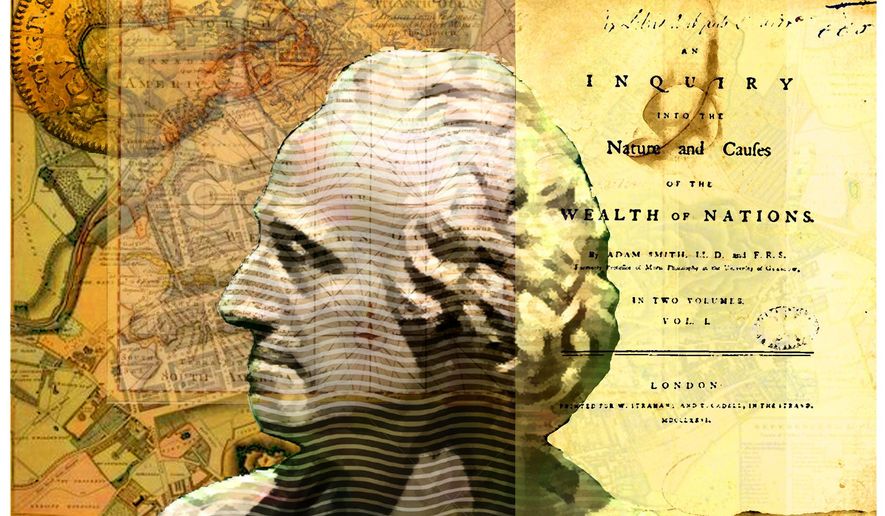OPINION:
Edinburgh, Scotland
This historic and most interesting city has never looked better, even during its earlier pre-eminence in the late 1700s when Adam Smith lived and died here. The current economy is largely based on financial services, research and tourism — all of which are “clean” industries — resulting in the end of the historic smoky image of Edinburgh.
Adam Smith was, of course, one of the towering figures on the Scottish Enlightenment. Smith is primarily known for two landmark books, “The Theory of Moral Sentiments” (published in 1759) and “An Inquiry into the Nature and Causes of the Wealth of Nations” (published in 1776), both of which were best-sellers in his time. “Wealth of Nations” was the first modern economics book and is rightly viewed as one of the most significant books ever written. Even after two centuries, many thousands of copies are still sold each year.
In the current debate over trade policy, Smith is often quoted by those on both sides of the argument. Smith was a free trader who argued that free trade increases the real income of consumers by reducing prices. Free trade increases the extent of the market that any one provider of a good or service can serve. An increase in market size reduces production-cost per unit (i.e. economies of scale), and both consumers and producers benefit. (It would be several more decades before the theory of comparative advantage was developed by David Ricardo that gave the other major argument for free trade.)
Despite being a free trader, Smith did support several exceptions. He provided limited support for the infant industry argument, which is based on the notion that new industries need to have some protection until they reach critical mass. He also acknowledged that there were a few cases where the imposition of a temporary tariff may induce another country to reduce trade restrictions, thus benefitting consumers in both countries. This is the Trumpian argument that Smith, like present-day critics, understood was risky and could backfire.
Critics of Smith claim that he was not “rigorous” enough — often meaning that he did not rely enough on empirical data and logical proofs. These critics tend to ignore that in Smith’s time little in data (in the modern sense) was available, along with the tools to process it. Smith was a practical man who wrote about the importance of “common sense.” After two centuries, we know that most of his common-sense insights as to the way the world works were indeed correct then and are now.
Both Smith partisans and critics tend to misrepresent Smith’s views on the appropriate size of government. He argued that there was an appropriate role for government — in providing for a court and justice system to protect property rights and basic liberties, in providing for defense, in providing for at least some public education, and even limited public works, such as roads and harbors.
But he argued that most government should be at the local level, where the individual citizen can understand what is going on and has more say. Smith had little use for politicians and those in government, who, he said, often wasted the labors of the people. He well understood the tendency and dangers of special interests, and particularly business people, to try to use government to restrict competition and grant monopolies. Thus, he was a fierce opponent of what we refer to today as crony capitalism.
Smith had spent some time in France and concluded that its more centralized government system was inferior to the more decentralized British one at the time. Despite the fact that Smith is well known for his laissez-faire views and favored minimal government regulation and taxation, he also made the argument for limited government interventions when he thought it would promote the public good. Thus, people on both sides of many current political and economic arguments can find something in Smith to support their views. The government sector of the economy was tiny in Smith’s time; and given his concern about government waste and misallocation of resources and income and restrictions on liberty, it is likely that he would be firmly in the small-government camp today.
Most of the American Founding Fathers had read “Wealth of Nations,” and its influence (and that of other thinkers of the Scottish Enlightenment, such as David Hume) can be readily seen in the U.S. Constitution and the Federalist Papers and other publications by the Founders. Smith and Benjamin Franklin were personal friends who met with each other a number of times, both in Paris and London.
Smith was well regarded among the educated in American at the time, not only because of the power of his books, but in part because he was a critic of the war being waged against the American colonies. Smith had made specific recommendations about how London should govern its colonies through inclusion. Perhaps if King George III and the leaders of Britain at the time had listened to Smith, the world might have turned out a bit better.
• Richard W. Rahn is chairman of Improbable Success Productions and on the board of the American Council for Capital Formation




Please read our comment policy before commenting.